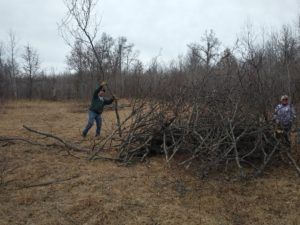On the Ground: Volunteers Improve Wildlife Habitat in Northern Michigan

OTG volunteers put the finishing touches on one of the 47 brush piles constructed on public land in Kalkaska during an OTG event on Saturday, March 27, 2021.
On Saturday, March 27, Michigan United Conservation Clubs’ On the Ground (OTG) program returned to Kalkaska to continue to improve wildlife habitat on public land. A group of 18 volunteers constructed more than 40 brush piles (“rabbitat”) within openings along Johnson Lake Road that will be utilized by wildlife that ranges from rabbit/hare and ruffed grouse to songbirds and reptiles. In addition to building brush piles, volunteers also prepared these openings to be managed as grassland habitat in the future.
The habitat provided by these natural openings was greatly enhanced through volunteer efforts this past weekend. By removing some of the larger cherry trees that were competing with the oak trees in the openings, the oaks will likely have greater success regenerating. Additionally, the site has now been prepared for future prescribed burns and native wildflower and grass plantings to restore these openings to healthy grasslands.
While this habitat continues to be restored, diverse wildlife can utilize the brush piles for supplemental cover as they travel between habitats, shielding them from predators and inclement weather alike. These brush piles may also serve as a location for nests and dens, and wildlife and insects of all kinds will benefit from their presence on the landscape throughout the different seasons. Larger sections of the tree trunks and limbs were also occasionally placed near the edge of the young aspen stands surrounding these openings to provide drumming logs for ruffed grouse.
We appreciate the volunteers that spent their Saturday volunteering for wildlife with OTG and we look forward to returning to this section of state forest land in the northwestern Lower Peninsula for additional habitat improvement efforts in the future.
To learn more about OTG and upcoming volunteer events, please visit mucc.org/on-the-ground or find us on Facebook at facebook.com/muccotg .
The post On the Ground: Volunteers Improve Wildlife Habitat in Northern Michigan appeared first on Michigan United Conservation Clubs.
Recent Posts



